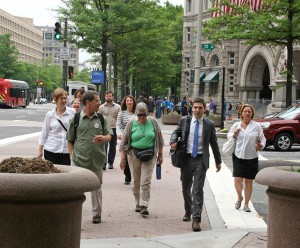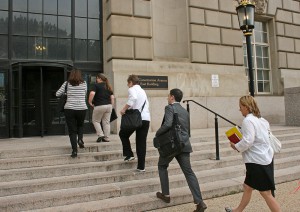
Members of the Alliance for Appalachia and Appalachian Voices walk to meetings in Washington, D.C., to talk with Congressional representatives and Obama officials about mountaintop removal coal mining. Photo by Joanne Hill
Earlier this month, a group of Appalachian citizens traveled to Washington, D.C., to tell members of Congress and Obama administration officials how mountaintop removal coal mining has contaminated drinking water, poisoned streams, polluted air, and devastated local economies in their communities. Judging by the reaction, their stories hit home with many of these decision makers.
A cornerstone of American democracy is the right of all citizens to air their grievances and pressure the government to take action. But it can be difficult for them to be heard alongside the amplified voices of monied special interests. That’s why a cornerstone of our mission at Appalachian Voices is to help citizens to combine their voices with those of others facing the same issues, as well as those of supporters across the region and the country, while providing tools and connections to ensure that they are heard.
Our D.C. office worked with our partners in the Alliance for Appalachia to facilitate this recent trip to the capital and to arrange meetings with 24 congressional offices, the U.S. Environmental Protection Agency, and the Office of Surface Mining Reclamation and Enforcement. I’m pleased to note that a direct result of those conversations is that, as of today, ten more members of Congress have agreed to co-sponsor the Clean Water Protection Act, which would close the loophole allowing coal companies to bury streams with mountaintop removal waste. And we expect more to co-sponsor in the coming weeks.
Standing shoulder-to-shoulder with people who have the most at stake is at the heart of Appalachian Voices’ philosophy. In North Carolina, we’re helping the families impacted by the coal ash crisis to influence state legislators and federal regulators. We’re teaching residents living amidst mountaintop removal how to test local waters for coal-related pollution and navigate the process of lodging complaints. And we’re connecting rural homeowners with local businesses and electric co-operatives to leverage funding opportunities to make energy-efficiency improvements on their homes, so they can save money and join the clean energy movement.
The common denominator in this work is engaging folks from all corners of our region and from all walks of life in speaking up for our natural heritage, our families, and our kids’ future together. Thanks, as always, for adding your voice to the mix.




Leave a Reply